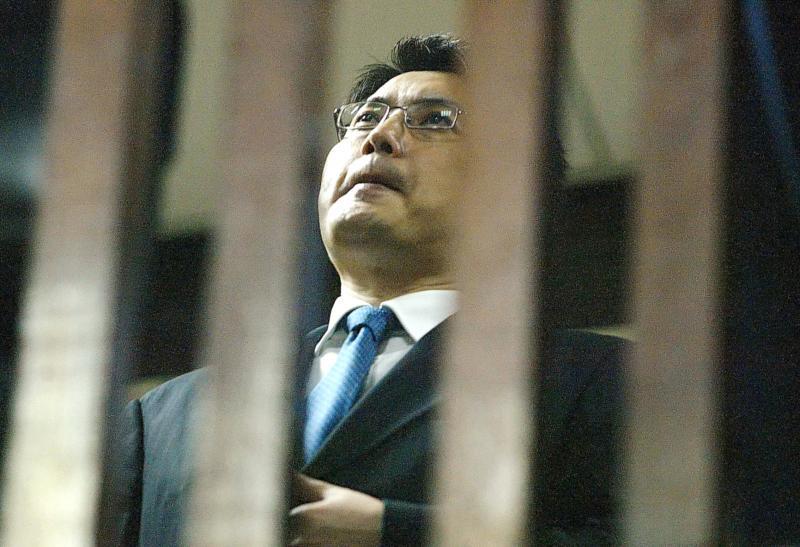The High Court today sentenced a former Financial Supervisory Commission (FSC) official to four years and five months in prison in connection with a stock-rigging case dating back two decades.
The ruling was handed down in the fifth retrial of Lee Chin-cheng (李進誠), who served as director-general of the FSC's Examination Bureau in 2005.

Photo: Wang Yi-sung, Taipei Times
The court reduced his sentence by one month from the previous ruling.
Lee must wear an electronic monitoring device until Aug. 5 next year, during which time he is required to take and submit facial photographs at regular intervals, the court said.
The ruling can be appealed, suggesting the prolonged legal battle may not yet be over.
Lee, a former prosecutor, was first sentenced to 10 years in prison in October 2005 by the Taipei District Court for contravening the Anti-Corruption Act (貪污治罪條例) in an insider trading case involving Power Quotient International shares.
He was found guilty of leaking details of a government investigation into the company to Lin Ming-da (林明達), who used the information to profit from trading Power Quotient stock.
Lee received his lightest sentence in September 2020, when the High Court reduced his jail term to six months, which could have been commuted to a fine at NT$900 per day.
That ruling was later overturned by the Supreme Court and sent back for retrial.

Taiwan has received more than US$70 million in royalties as of the end of last year from developing the F-16V jet as countries worldwide purchase or upgrade to this popular model, government and military officials said on Saturday. Taiwan funded the development of the F-16V jet and ended up the sole investor as other countries withdrew from the program. Now the F-16V is increasingly popular and countries must pay Taiwan a percentage in royalties when they purchase new F-16V aircraft or upgrade older F-16 models. The next five years are expected to be the peak for these royalties, with Taiwan potentially earning

STAY IN YOUR LANE: As the US and Israel attack Iran, the ministry has warned China not to overstep by including Taiwanese citizens in its evacuation orders The Ministry of Foreign Affairs (MOFA) yesterday rebuked a statement by China’s embassy in Israel that it would evacuate Taiwanese holders of Chinese travel documents from Israel amid the latter’s escalating conflict with Iran. Tensions have risen across the Middle East in the wake of US and Israeli airstrikes on Iran beginning Saturday. China subsequently issued an evacuation notice for its citizens. In a news release, the Chinese embassy in Israel said holders of “Taiwan compatriot permits (台胞證)” issued to Taiwanese nationals by Chinese authorities for travel to China — could register for evacuation to Egypt. In Taipei, the ministry yesterday said Taiwan

Taiwan is awaiting official notification from the US regarding the status of the Agreement on Reciprocal Trade (ART) after the US Supreme Court ruled US President Donald Trump's global tariffs unconstitutional. Speaking to reporters before a legislative hearing today, Premier Cho Jung-tai (卓榮泰) said that Taiwan's negotiation team remains focused on ensuring that the bilateral trade deal remains intact despite the legal challenge to Trump's tariff policy. "The US has pledged to notify its trade partners once the subsequent administrative and legal processes are finalized, and that certainly includes Taiwan," Cho said when asked about opposition parties’ doubts that the ART was

If China chose to invade Taiwan tomorrow, it would only have to sever three undersea fiber-optic cable clusters to cause a data blackout, Jason Hsu (許毓仁), a senior fellow at the Hudson Institute and former Chinese Nationalist Party (KMT) legislator, told a US security panel yesterday. In a Taiwan contingency, cable disruption would be one of the earliest preinvasion actions and the signal that escalation had begun, he said, adding that Taiwan’s current cable repair capabilities are insufficient. The US-China Economic and Security Review Commission (USCC) yesterday held a hearing on US-China Competition Under the Sea, with Hsu speaking on